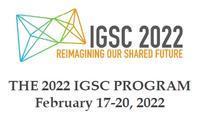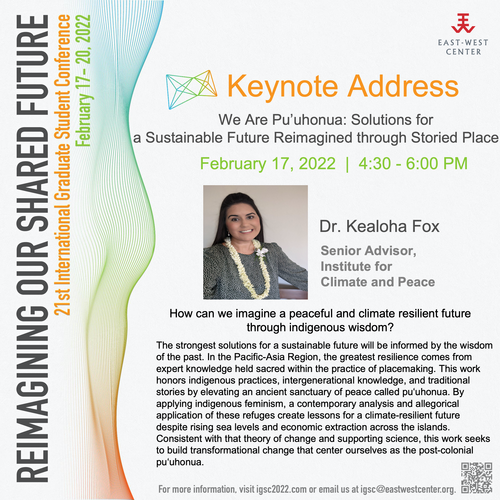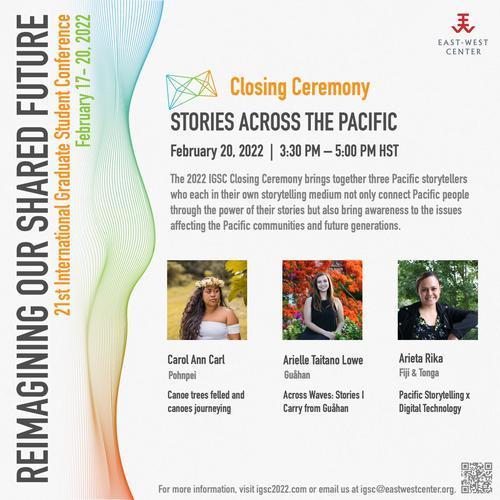Error message

OFFICE/DEPARTMENT
The registration for International Graduate Student Conference (IGSC) 2022 is now open for the general public to attend. REGISTER NOW
After obtaining the free ticket, please sign up through Whova. For more information about the conference, please visit the 2022 IGSC website. You can access the program agenda here.
The IGSC will be hosted online, utilizing the conference platform Whova, which incorporates real-time program sessions, poster sessions, Zoom group meetings, and various virtual activities for dynamic interactions among participants.
Click here to download this year's program:

KEYNOTE ADDRESS, FEBRUARY 17, 4:30-6PM HST

“Laʻi ka moku o ka nohona.
There is peace in the land of our existence.”
~ traditional Hawaiian proverb
Erratic severe weather, global warming, and environmental change is the universal context within which all future events throughout the globe will unfold into society. The strongest solutions for a sustainable future will be informed by the wisdom of the past. In the Pacific-Asia Region, the greatest resilience comes from expert knowledge held sacred within the practice of placemaking. As such, there is value to centering indigenous worldviews to amplify resilience and positive peace in the context of the ongoing climate crisis. By coupling positive peacebuilding problem-solving methods with rigorous climate change research and resilience strategies, we equip decision makers with the tools needed to respond to the climate crisis, reduce social friction, and build social cohesion through locally-based and culturally-appropriate responses.
Impact, opportunity recognition, and development of programs designed to scale community-based solutions already in existence is among the most just ways to meet local and global goals. This will be the key to unlocking innovation and ensuring durability and resilience of solutions to the climate emergency and the survival of our homelands.
This work honors indigenous practices, intergenerational knowledge, and traditional stories by elevating an ancient sanctuary of peace called pu‘uhonua. In Pacific tradition, pu‘uhonua were physical places that people could go to escape violence, abuse, or death after some type of crisis occurred. By applying indigenous feminism, a contemporary analysis and allegorical application of these refuges create lessons for a climate-resilient future despite rising sea levels and economic extraction across the islands.
The purpose of this work is to engage leaders of all disciplines with a lens oriented toward solutions to implement resilient strategies into their communities, activate discourse, and strive towards a world of justice using climate as the overarching context. Consistent with that theory of change and supporting science, this work seeks to build transformational change that center ourselves as the post-colonial pu‘uhonua.
Speaker: Kealoha Fox, PhD, Senior Advisor, Institute for Climate and Peace
CLOSING CEREMONY, FEBRUARY 20, 3:30-5:00PM HST
Storytelling lets us revisit indigenous knowledge, traditions, values and beliefs that have been handed down from generations to generations. The closing event brings together three Pacific storytellers who each in their own storytelling medium not only connect Pacific people through the power of their stories but also bring awareness to the issues affecting the Pacific communities and future generations.

THEME: REIMAGINING OUR SHARED FUTURE
This year is the 21st year of the International Graduate Student Conference (IGSC) taking place February 17-20th, 2022. The East-West Center (EWC) is inviting graduate students and young professionals from around the world to submit abstracts relating to the Asia Pacific region. The conference will provide an opportunity to share interdisciplinary or transdisciplinary perspectives formally, through presenting and attending panel presentations, and informally, through networking with scholars and community members across disciplines in the warm and collaborative environment of the EWC.
A long-standing goal of the EWC has been to promote collaborative and mutually-beneficial partnerships between communities and scholars. Much of our research is rooted in the collective knowledge, insight, and years of effort contributed by communities, organizations, and experts across the Asia-Pacific region. Even so, academic findings can often end up limited to scholars and experts, which leads to a greater knowledge gap between researchers and working professionals. Therefore, innovative types of communication and partnership are needed to promote research understanding and community interaction.
This year the conference theme is "Reimagining our Shared Future." With emergent challenges at the planetary level, ranging from environmental issues, rising inequalities, poverty, ideological polarization, to a global pandemic, it is essential to reimagine a more just and sustainable future for all on our shared planet Earth. These issues prompt renewed attention to the entire ecosystem—living beings and nonliving things—that form the basis of life on Earth. This includes but is not limited to humans, animals, plants, inanimate objects, elements, energy, systems and structures.
Besides producing new knowledge and innovative solutions, emerging scholars’ responsibilities may also include revisiting ancient or indigenous knowledge concerning the human or non-human world that crosses a multiplicity of disciplines to address the contemporary issues on Earth. Thus, IGSC 2022 invites contributions across a wide range of disciplines that
(1) aim to contribute to the sharing and advancement of the multiple knowledges, epistemologies, and ontologies of the Asia-Pacific region, and
(2) reimagine theory, practice, and policy for a more just and sustainable shared future.
We also invite artistic expressions that utilize alternative methods for reimagining the world we live in.
We especially welcome (but are not limited to) interdisciplinary and transdisciplinary contributions, and research that applies non-Western, decolonial, post-colonial, and indigenous lenses.
For any inquiries or questions regarding the conference, please connect with us at [email protected].
The registration for International Graduate Student Conference (IGSC) 2022 is now open for the general public to attend. REGISTER NOW
After obtaining the free ticket, please sign up through Whova. For more information about the conference, please visit the 2022 IGSC website. You can access the program agenda here.
The IGSC will be hosted online, utilizing the conference platform Whova, which incorporates real-time program sessions, poster sessions, Zoom group meetings, and various virtual activities for dynamic interactions among participants.
Click here to download this year's program:

KEYNOTE ADDRESS, FEBRUARY 17, 4:30-6PM HST

“Laʻi ka moku o ka nohona.
There is peace in the land of our existence.”
~ traditional Hawaiian proverb
Erratic severe weather, global warming, and environmental change is the universal context within which all future events throughout the globe will unfold into society. The strongest solutions for a sustainable future will be informed by the wisdom of the past. In the Pacific-Asia Region, the greatest resilience comes from expert knowledge held sacred within the practice of placemaking. As such, there is value to centering indigenous worldviews to amplify resilience and positive peace in the context of the ongoing climate crisis. By coupling positive peacebuilding problem-solving methods with rigorous climate change research and resilience strategies, we equip decision makers with the tools needed to respond to the climate crisis, reduce social friction, and build social cohesion through locally-based and culturally-appropriate responses.
Impact, opportunity recognition, and development of programs designed to scale community-based solutions already in existence is among the most just ways to meet local and global goals. This will be the key to unlocking innovation and ensuring durability and resilience of solutions to the climate emergency and the survival of our homelands.
This work honors indigenous practices, intergenerational knowledge, and traditional stories by elevating an ancient sanctuary of peace called pu‘uhonua. In Pacific tradition, pu‘uhonua were physical places that people could go to escape violence, abuse, or death after some type of crisis occurred. By applying indigenous feminism, a contemporary analysis and allegorical application of these refuges create lessons for a climate-resilient future despite rising sea levels and economic extraction across the islands.
The purpose of this work is to engage leaders of all disciplines with a lens oriented toward solutions to implement resilient strategies into their communities, activate discourse, and strive towards a world of justice using climate as the overarching context. Consistent with that theory of change and supporting science, this work seeks to build transformational change that center ourselves as the post-colonial pu‘uhonua.
Speaker: Kealoha Fox, PhD, Senior Advisor, Institute for Climate and Peace
CLOSING CEREMONY, FEBRUARY 20, 3:30-5:00PM HST
Storytelling lets us revisit indigenous knowledge, traditions, values and beliefs that have been handed down from generations to generations. The closing event brings together three Pacific storytellers who each in their own storytelling medium not only connect Pacific people through the power of their stories but also bring awareness to the issues affecting the Pacific communities and future generations.

THEME: REIMAGINING OUR SHARED FUTURE
This year is the 21st year of the International Graduate Student Conference (IGSC) taking place February 17-20th, 2022. The East-West Center (EWC) is inviting graduate students and young professionals from around the world to submit abstracts relating to the Asia Pacific region. The conference will provide an opportunity to share interdisciplinary or transdisciplinary perspectives formally, through presenting and attending panel presentations, and informally, through networking with scholars and community members across disciplines in the warm and collaborative environment of the EWC.
A long-standing goal of the EWC has been to promote collaborative and mutually-beneficial partnerships between communities and scholars. Much of our research is rooted in the collective knowledge, insight, and years of effort contributed by communities, organizations, and experts across the Asia-Pacific region. Even so, academic findings can often end up limited to scholars and experts, which leads to a greater knowledge gap between researchers and working professionals. Therefore, innovative types of communication and partnership are needed to promote research understanding and community interaction.
This year the conference theme is "Reimagining our Shared Future." With emergent challenges at the planetary level, ranging from environmental issues, rising inequalities, poverty, ideological polarization, to a global pandemic, it is essential to reimagine a more just and sustainable future for all on our shared planet Earth. These issues prompt renewed attention to the entire ecosystem—living beings and nonliving things—that form the basis of life on Earth. This includes but is not limited to humans, animals, plants, inanimate objects, elements, energy, systems and structures.
Besides producing new knowledge and innovative solutions, emerging scholars’ responsibilities may also include revisiting ancient or indigenous knowledge concerning the human or non-human world that crosses a multiplicity of disciplines to address the contemporary issues on Earth. Thus, IGSC 2022 invites contributions across a wide range of disciplines that
(1) aim to contribute to the sharing and advancement of the multiple knowledges, epistemologies, and ontologies of the Asia-Pacific region, and
(2) reimagine theory, practice, and policy for a more just and sustainable shared future.
We also invite artistic expressions that utilize alternative methods for reimagining the world we live in.
We especially welcome (but are not limited to) interdisciplinary and transdisciplinary contributions, and research that applies non-Western, decolonial, post-colonial, and indigenous lenses.
For any inquiries or questions regarding the conference, please connect with us at [email protected].






